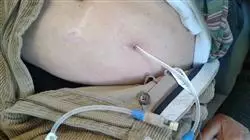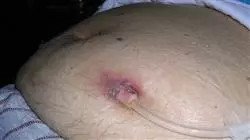University certificate
The world's largest faculty of nursing”
Introduction to the Program
Improve your knowledge in Peritoneal Dialysis for Nursing through this program, where you will find the best didactic material with real clinical cases. Learn here about the latest advances in the specialty to be able to perform a quality medical practice"

Nursing plays a decisive role in the care of the patient with chronic kidney disease, both from its onset and in later stages. In addition to skills in renal replacement techniques such as the acquisition of specific professional competencies, specific and quality care is required at the different stages of renal disease.
The care of the nephrological patient, including renal function replacement techniques, has made significant advances in recent years, both in terms of renal transplantation and the health care of the nephrological patient, requiring specialized and continuous training for nurses. Such specialized training is rarely found in standard curricular training, so many nurses are unaware of important aspects of caring for these patients. Training in this area is necessary to guarantee a minimum quality of care.
Increase your skills in the Peritoneal Dialysis for Nursing approach with this Postgraduate diploma"
This Postgraduate diploma in Peritoneal Dialysis for Nursing contains the most complete and up-to-date scientific program on the market. The most important features include:
- Development of clinical cases presented by experts in the different areas of multidisciplinary knowledge. The graphic, schematic, and eminently practical contents of which they are composed provide scientific and practical information on the disciplines that are essential for professional practice
- New developments in Peritoneal Dialysis for Nurses
- Algorithm-based interactive learning system for decision-making in the presented clinical situations
- With a special emphasis on evidence-based nursing and Peritoneal Dialysis research methodologies for Nursing
- All this will be complemented by theoretical lessons, questions to the expert, debate forums on controversial topics, and individual reflection assignments
- Content that is accessible from any fixed or portable device with an Internet connection
This Postgraduate diploma may be the best investment you can make in the selection of a refresher program for two reasons: in addition to updating your knowledge in Peritoneal Dialysis, you will obtain a certificate from TECH Global University"
Its teaching staff includes health professionals from the fields of nursing and nephrological medicine, who bring to this training the experience of their work, in addition to recognized specialists belonging to leading scientific societies.
The multimedia content developed with the latest educational technology will provide the professional with situated and contextual learning, i.e., a simulated environment that will provide an immersive training program to train in real situations.
The design of this program is based on Problem Based Learning, by means of which the nursing professional must try to solve the different professional practice situations that arise throughout the course. This will be done with the help of an innovative interactive video system developed by renowned experts in the field of nephrology with extensive teaching experience.
The Postgraduate diploma allows training in simulated environments, which provide immersive learning programmed to train for real situations"

It includes clinical cases to bring the program's degree as close as possible to the reality of care in Nursing"
Why study at TECH?
TECH is the world’s largest online university. With an impressive catalog of more than 14,000 university programs available in 11 languages, it is positioned as a leader in employability, with a 99% job placement rate. In addition, it relies on an enormous faculty of more than 6,000 professors of the highest international renown.

Study at the world's largest online university and guarantee your professional success. The future starts at TECH”
The world’s best online university according to FORBES
The prestigious Forbes magazine, specialized in business and finance, has highlighted TECH as “the world's best online university” This is what they have recently stated in an article in their digital edition in which they echo the success story of this institution, “thanks to the academic offer it provides, the selection of its teaching staff, and an innovative learning method aimed at educating the professionals of the future”
A revolutionary study method, a cutting-edge faculty and a practical focus: the key to TECH's success.
The most complete study plans on the university scene
TECH offers the most complete study plans on the university scene, with syllabuses that cover fundamental concepts and, at the same time, the main scientific advances in their specific scientific areas. In addition, these programs are continuously being updated to guarantee students the academic vanguard and the most in-demand professional skills. In this way, the university's qualifications provide its graduates with a significant advantage to propel their careers to success.
TECH offers the most comprehensive and intensive study plans on the current university scene.
A world-class teaching staff
TECH's teaching staff is made up of more than 6,000 professors with the highest international recognition. Professors, researchers and top executives of multinational companies, including Isaiah Covington, performance coach of the Boston Celtics; Magda Romanska, principal investigator at Harvard MetaLAB; Ignacio Wistumba, chairman of the department of translational molecular pathology at MD Anderson Cancer Center; and D.W. Pine, creative director of TIME magazine, among others.
Internationally renowned experts, specialized in different branches of Health, Technology, Communication and Business, form part of the TECH faculty.
A unique learning method
TECH is the first university to use Relearning in all its programs. It is the best online learning methodology, accredited with international teaching quality certifications, provided by prestigious educational agencies. In addition, this disruptive educational model is complemented with the “Case Method”, thereby setting up a unique online teaching strategy. Innovative teaching resources are also implemented, including detailed videos, infographics and interactive summaries.
TECH combines Relearning and the Case Method in all its university programs to guarantee excellent theoretical and practical learning, studying whenever and wherever you want.
The world's largest online university
TECH is the world’s largest online university. We are the largest educational institution, with the best and widest online educational catalog, one hundred percent online and covering the vast majority of areas of knowledge. We offer a large selection of our own degrees and accredited online undergraduate and postgraduate degrees. In total, more than 14,000 university degrees, in eleven different languages, make us the largest educational largest in the world.
TECH has the world's most extensive catalog of academic and official programs, available in more than 11 languages.
Google Premier Partner
The American technology giant has awarded TECH the Google Google Premier Partner badge. This award, which is only available to 3% of the world's companies, highlights the efficient, flexible and tailored experience that this university provides to students. The recognition as a Google Premier Partner not only accredits the maximum rigor, performance and investment in TECH's digital infrastructures, but also places this university as one of the world's leading technology companies.
Google has positioned TECH in the top 3% of the world's most important technology companies by awarding it its Google Premier Partner badge.
The official online university of the NBA
TECH is the official online university of the NBA. Thanks to our agreement with the biggest league in basketball, we offer our students exclusive university programs, as well as a wide variety of educational resources focused on the business of the league and other areas of the sports industry. Each program is made up of a uniquely designed syllabus and features exceptional guest hosts: professionals with a distinguished sports background who will offer their expertise on the most relevant topics.
TECH has been selected by the NBA, the world's top basketball league, as its official online university.
The top-rated university by its students
Students have positioned TECH as the world's top-rated university on the main review websites, with a highest rating of 4.9 out of 5, obtained from more than 1,000 reviews. These results consolidate TECH as the benchmark university institution at an international level, reflecting the excellence and positive impact of its educational model.” reflecting the excellence and positive impact of its educational model.”
TECH is the world’s top-rated university by its students.
Leaders in employability
TECH has managed to become the leading university in employability. 99% of its students obtain jobs in the academic field they have studied, within one year of completing any of the university's programs. A similar number achieve immediate career enhancement. All this thanks to a study methodology that bases its effectiveness on the acquisition of practical skills, which are absolutely necessary for professional development.
99% of TECH graduates find a job within a year of completing their studies.
Postgraduate Diploma in Peritoneal Dialysis for Nursing
Taking into account the advances regarding the treatment of kidney disease and the importance of having theoretical and practical skills for the execution of interventions, at TECH Global University We have created this specialized program in the comprehensive approach to the medical tables that present this type of patient. Throughout the 6 months required by the study plan, students will delve into the most recent findings on pathologies and their respective care to subsequently broaden their knowledge in everything related to examination methods in nephrology, to the pharmacokinetics and dosage of this procedure. In a second moment, the fundamental aspects of diagnosis, etiology, pathophysiology and prevention in renal failure will be revisited. Thanks to the thematic tour proposed by our teaching team, professionals in this area will be able to acquire the necessary skills to carry out the daily activities required by their work, in order to improve the quality of life of those affected.
Postgraduate Diploma in Peritoneal Dialysis for Nursing
Taking this TECH postgraduate Postgraduate Diploma is an important opportunity to enrich medical/clinical practice, while empowering students in the proper medical management of the most difficult stages of renal pathologies, through the use of the case analysis methodology, which allows solving real situations by mobilizing the given resources. From the early identification of clinical signs and risk factors, it will be possible to establish in advance the action frameworks available in order to design the guidelines that will determine the application of techniques. These ways of proceeding will favor, in turn, the elaboration of follow-up protocol controls and essential considerations for renal support care. All this, in addition, enables the future graduate in the proper management of physical and emotional pain, since content referring to the management of communication techniques such as the so-called "Counselling" is offered. In this way, at the end of the program, it will be characterized For being a seasoned professional, Postgraduate Diploma in providing quality care tailored to the needs of patients.







